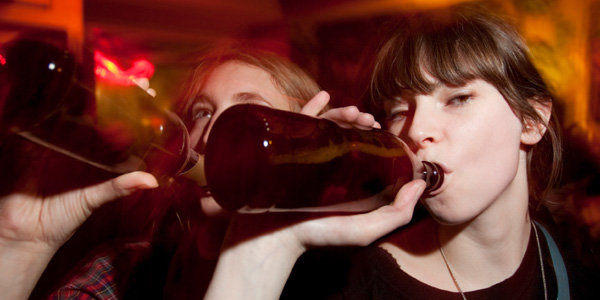What Drunkorexia is Doing to College Students

At first, "drunkorexia" may sound like kind of a funny word, jokingly made up to describe a situation in which college students and others forgo food in order to be able to afford more alcohol and feel higher effects of alcohol on an empty stomach. But what some may brush off as crazy college-kid behavior is actually a serious problem that can have highly damaging consequences both in long- and short-term health. Of course, that hasn't stopped college students from engaging in this unhealthy trend, and a study at the University of Missouri-Columbia indicated that one in six students had practiced drunkorexia within the last year. Typically, drunkorexia is done by women; the study showed that three out of four drunkorexia respondents were female.
Students may not realize that drunkorexia is incredibly damaging to their health, but the fact remains that the practice puts them at risk for problems like sexually transmitted diseases, malnutrition, and even seizures and comas. Specifically, the University of Missouri study indicates that drunkorexia may lead to:
- sexually transmitted diseases
- HIV
- drunk driving
- alcohol poisoning
- injury risk
- perpetrating or being a victim of sexual assault
- passing out
- malnutrition
- heart problems
- cognitive disabilities
- seizure
- comas
- organ failure
So it seems that a practice that may be approached lightheartedly is in fact a very serious problem that doesn't just stop with fun (and possible weight loss) one night. Used as a regular practice, drunkorexia can scar you for life and even end in death. And although the long-term effects are certainly frightening, the short-term possibilities of drunkorexia aren't incredibly easy hurdles to get over, either. Just one night of drunkorexia can have serious consequences, with higher levels of intoxication and starvation putting students at risk for dangerous behavior. At high levels of intoxication, students lose the ability to make good decisions, which can lead to dangerous situations like having unprotected sex, or even being involved in a rape, driving drunk, and becoming injured as a result of stunts, fights, or simply an inability to function properly. In addition to these risks, just one night of intense drinking on an empty stomach can lead to blackouts, hospitalization, and death from alcohol poisoning. Clearly, drunkorexia has serious and lasting consequences, even for students who aren't repeat offenders.

Drunkorexia is a scary situation for any college student, but for women, the problem is compounded. Female students are not only more prone to engage in drunkorexia, but they are also at a higher risk of problems from its effects. Dr. Valerie Taylor, chief of psychiatry at Women's College Hospital in Toronto indicates that female college students are more likely to engage in drunkorexia due to social pressure to stay slim. Even worse, female students are more likely to experience higher effects (meaning: reach alcohol poisoning and organ damage faster) because women metabolize alcohol faster than men. These facts combined with a higher risk of sexual assault mean that girls in college are hit with an even scarier drunkorexia situation.
How did things get so bad? It's one thing to have an eating disorder, and another to have a substance abuse problem, but combined, they're an incredible problem to overcome. Dr. Bunnell, former president of the National Eating Disorders Association, says that college students often suffer from an obsession with being skinny, while at the same time noticing the social acceptance of alcohol and drug abuse. In a world where celebrities checking into rehab is a regular practice and can even be "downright chic," it's not hard to understand why college students, especially female students, might think that drunkorexia is OK. But on top of social pressures, psychologists share that eating disorders may also be rooted in deep emotional pain. Alcohol, binging, and purging can provide an outlet for mental anguish, including childhood traumas like sexual abuse and neglect.
Such deep problems don't often come with an easy cure, and in some cases, require hospitalization and rehab. Judy Van De Veen suffered from eating disorders for years, and also took up drinking in later years. Things got so bad, she had to join a 12-step program and spent two years in and out of rehab, which cost her $25,000 out of her own pocket. None of them helped, but after becoming pregnant and joining support groups to address her daughter's caloric needs, she found an "excuse to eat" and be happy about it. Although Van De Veen's case is an extreme one, it offers a cautionary tale for students who are engaging in drunkorexia. Without help, things can go too far, resulting in a problem that can haunt you for decades, cost thousands of dollars, and even put your future family at risk.
We hope it's clear by now that drunkorexia is not harmless and is actually quite dangerous to the lives and long-term health of college students. So what can you do to avoid it and stop the practice on campus? FastWeb points out that college is a great place to simply ask for help. There are resources on every college campus to deal with not only alcohol abuse, but also eating disorders. College counselors are there to help, and your student fees have already paid for the visits. If you or a friend are suffering from drunkorexia, don't hesitate to speak up and get help while you still can. Be supportive with friends who may have a drunkorexia problem, offering positive reinforcement as well as fun alternatives to drinking, like movies and going out to dinner. It's also a good idea to set a good example by making responsible decisions with alcohol or avoiding it completely.
November 21st, 2011 written by Site Administrator
